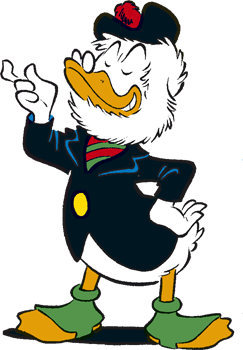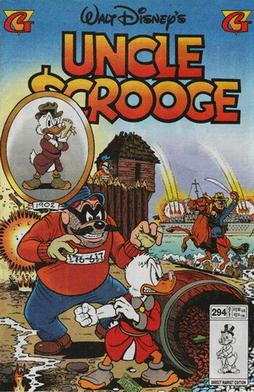Plot
The Beagle Boys visit their grandfather, Blackheart Beagle, in prison to celebrate the anniversary of his founding of the original Beagle Boys gang. Blackheart uses this chance to inform his grandsons of having remembered the architect, who designed the Money Bin. Since the architect's office is located underneath Duckburg, Blackheart suggests his grandsons to see if they can find the blueprint of the Money Bin. Blackheart remains in prison, but his grandsons are free to try out the plan. They find the blueprint, and it shows a secret passageway to Scrooge McDuck's money, located in Scrooge's bedroom.
While Scrooge is away, the Beagle Boys sneak into the Money Bin. However, by twists of fate - mostly caused by the Beagle Boys' personal lust for treasure, prunes, or personal fame, or just simple curiosity - they get caught in situations where they're mostly unable to even move, without triggering the bin's alarms or risking personal injury.
After an extremely long and stressful work day, Scrooge comes home late in the evening. He waves good night to a painting of Glittering Goldie, and goes to bed. In his tired stupor, he mistakes the various trapped Beagle Boys he sees for household items, until he climbs into bed and "turns out" the Beagle Boy trapped at his bedside, mistaking him for a lamp. Realizing his mistake, Scrooge calls the police, who arrest the Beagle Boys.
Back in prison, Blackheart Beagle hears of this, and curses his grandsons for being so stupid that they lost not to Scrooge, but to an empty concrete building.

Scrooge McDuck is a cartoon character created in 1947 for The Walt Disney Company by Carl Barks. Appearing in Disney comics, Scrooge is a Scottish-born American anthropomorphic Pekin duck. Like his nephew, Donald Duck, he has a yellow-orange bill, legs, and feet. He typically wears a red or blue frock coat, top hat, pince-nez glasses, and spats varying in color. He is portrayed in animation as speaking with a Scottish accent. Originally intended to be used only once, Scrooge became one of the most popular characters in the Disney comics world, as well as Barks' signature work. Scrooge is an extremely rich duck who lives in the fictional city of Duckburg in the fictional U.S. state of Calisota, whose claimed location is in real-world California, United States.

The Clan McDuck is a fictional Scottish clan of cartoon ducks from which Disney character Scrooge McDuck is descended. Within the Donald Duck universe, the clan is related to the American Duck family through the marriage of Hortense McDuck and Quackmore Duck, Donald and Della Duck's parents, giving both of them partial Scottish ancestry.

Gyro Gearloose is a cartoon character created in 1952 by Carl Barks for Disney comics. An anthropomorphic chicken, he is part of the Donald Duck universe, appearing in comic book stories as a friend of Donald Duck, Scrooge McDuck, and anyone who is associated with them. He was also featured in the animated series DuckTales. Gyro first appeared in the Carl Barks comic "Gladstone's Terrible Secret", and was the regular lead character in 4-page backup stories in Barks' issues of Uncle Scrooge, starting with issue #13 and continuing through #41.

Magica De Spell is a cartoon character created in 1961 by Carl Barks for the Duck universe. An Italian sorceress, she constantly attempts to steal Scrooge McDuck's Number One Dime, which she believes will play a vital role in magically obtaining the same fabulous wealth of its owner.

Flintheart Glomgold is a cartoon character created in 1956 by Carl Barks. He is a South African American Pekin Duck and the business rival of Scrooge McDuck, usually portrayed as an ambitious, ruthless, and manipulative businessman who shares many of the same qualities as Scrooge—the drive for massive wealth, and the cunning and creativity to obtain the same—but he lacks any of Scrooge's tendencies towards generosity and compassion. In Don Rosa's The Life and Times of Scrooge McDuck, he is said to be a Boer.

The Donald Duck universe is a fictional shared universe which is the setting of stories involving Disney cartoon character Donald Duck, as well as Daisy Duck, Huey, Dewey, and Louie, Scrooge McDuck, and many other characters. Life in the Donald Duck universe centers on the city of Duckburg and is a part of the larger Mickey Mouse universe. In addition to the original comic book stories by Carl Barks, the Duckburg cast was featured in Little Golden Books, television series such as DuckTales (1987–1991), Darkwing Duck (1991–1992), and the DuckTales reboot (2017–2021), and video games such as DuckTales (1989), QuackShot (1991), Goin' Quackers (2000), and DuckTales: Remastered (2013).

The Beagle Boys are a group of cartoon characters created in 1951 by Carl Barks for the Donald Duck universe. They are a family clan of organized criminals who constantly try to rob Scrooge McDuck. Their introduction and first appearance was in "Terror of the Beagle Boys", although in this story they only appear in the last frame and have no lines. They appear again in the next issue in a similar fashion, in The Big Bin on Killmotor Hill.

The Duck family is a fictional family of cartoon ducks related to Disney character Donald Duck. The family is also related to the Coot, Goose, and Gander families, as well as the Scottish Clan McDuck. Besides Donald, the best-known members of the Duck family are Huey, Dewey, and Louie, Donald's triplet nephews.

Uncle Scrooge is a Disney comic book series starring Scrooge McDuck, his nephew Donald Duck, and grandnephews Huey, Dewey, and Louie, and revolving around their adventures in Duckburg and around the world. It was first published in Four Color Comics #386, as a spin-off of the popular Donald Duck series and is still presently ongoing. It has been produced under the aegis of several different publishers, including Western Publishing, Gladstone Publishing, Disney Comics, Gemstone Publishing, Boom! Studios, and IDW Publishing, and has undergone several hiatuses of varying length. Despite this, it has maintained the same numbering scheme throughout its six decade history, with only IDW adding a secondary numbering that started at #1.

DuckTales is an American animated television series produced by Walt Disney Television Animation. It originally premiered on syndication on September 18, 1987, and ran for a total of 100 episodes over four seasons, with its final episode airing on November 28, 1990. Based upon Uncle Scrooge and other Duck universe comic books created by Carl Barks, the show follows Scrooge McDuck, his three grandnephews Huey, Dewey, and Louie, and close friends of the group, on various adventures, most of which either involve seeking out treasure or thwarting the efforts of villains seeking to steal Scrooge's fortune or his Number One Dime.

"Only a Poor Old Man" is a 32-page Disney comics story written, drawn, and lettered by Carl Barks. It was published in Four Color #386 as the first issue of Uncle Scrooge. Scrooge McDuck had already made his debut as a supporting character in the 1947 Donald Duck story "Christmas on Bear Mountain", and made several other appearances in Donald Duck stories in Walt Disney's Comics and Stories, but "Poor Old Man" was the first comic book story with Scrooge as the main character.

"A Little Something Special" is a 1997 Disney comics story created by Don Rosa to celebrate the 50th anniversary of Scrooge McDuck's first appearance in Carl Barks's "Christmas on Bear Mountain" in 1947.

"His Majesty, McDuck" is a Donald Duck story by Don Rosa, first published in Uncle Scrooge Adventures #14 in August 1989.

"Cash Flow" is an Uncle Scrooge adventure comic written and drawn by Don Rosa, first published in Uncle Scrooge #224 in December 1987. It was the first of Rosa's stories to feature the Beagle Boys. Like some other comic stories by Don Rosa this story is founded in toying with the physical laws. Rosa says that he got the ideas for these comics from the mechanical engineering courses he took before he became a professional cartoonist.

"The Richest Duck in the World" or "The Recluse of McDuck Manor" is a 1994 Scrooge McDuck comic by Don Rosa. It is the twelfth of the original 12 chapters in the series The Life and Times of Scrooge McDuck. The story takes place on Christmas Day, 1947.

"The Empire-Builder from Calisota" or "The Richest Duck in the World" is a 1994 Scrooge McDuck comic by Don Rosa. It is the eleventh of the original 12 chapters in the series The Life and Times of Scrooge McDuck. The story takes place from 1909 to 1930 and details Scrooge finishing his quest to become the richest man in the world, during which he becomes hardened and overall hostile towards others.

"The Invader of Fort Duckburg" is a 1994 Scrooge McDuck comic by Don Rosa. It is the tenth of the original 12 chapters in the series The Life and Times of Scrooge McDuck. The story takes place in 1902.
"The Dream of a Lifetime" is a 2002 Donald Duck comic by Don Rosa. The story was first published in the Danish Anders And & Co. #2002-49; the first American publication was in Uncle Scrooge #329, in May 2004.

















